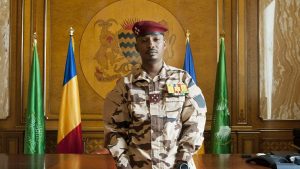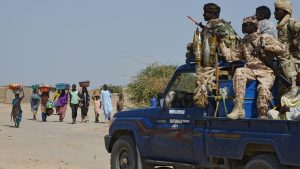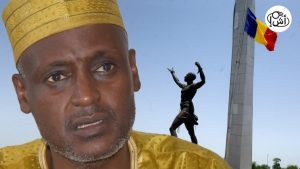Recent events in Chad have exposed the fragility of the West’s commitments to democratic norms the violent coup in Chad illustrates the complex conflict of alliances and interests that define the region’s political landscape.
The event began with the arrest of Yahya Dilou Giraud, leader of the “Socialist Party Without Borders”, who is the nephew of Lieutenant General Mohamed Idriss Deby Itno, head of the Transitional Military Council, which the army announced to form to lead the country, after the dissolution of the government and parliament following the death of President Idriss Deby, the father of the current interim president, on April 20, 2021, and then the event developed with the killing of Giroud in a prelude to a new coup orchestrated by the government to consolidate its foundations, and monopolize power ahead of the upcoming presidential elections, which revealed a scenario that paves the way For the victory of Mohamed Déby in the elections.

According to Western reports, his candidacy was supported by representatives of leftist groups, which make up the Coalition for a United Chad, and the military leader’s announcement comes just three days after his rival in the elections, Djeiro, was shot dead in the capital, N’Djamena.
Mohamed Idriss Déby, the father of the current interim president, has been an ally of France and the United States for three decades, and has long tightened his grip on Chad in the battles against Islamist militants in the African Sahel region. He faces the test of his claims to support democracy in Chad or cling to an old military ally.

The recent violence in Chad has put the positions of international parties to the test of a completely burning region, as the European narrative of strengthening democracy falls permanently amid a geopolitical scene linked to the West’s reaction to the coup, or dealing with the fait accompli and opening the door to Chadian internal conflicts, which enhances the possibilities of additional international interventions and the escalation of Western fears of the possibility of strengthening the Russian role in that region, as undermining the fragile state has become one of the scenarios around which the game of interests revolves, and it is unlikely that the United States or France will rise with a proactive stance against factors of instability, as they are likely to use foreign aid and international institutions more dynamically to strengthen their current presence regardless of Chad’s domestic political game.

On the other hand, the recent assassination of Yahya Dilou Giroud represents a dangerous escalation in the methods of suppressing dissent, as “Giroud” put himself in the circle of disagreement with the ruling elite, and his death along with many of his supporters during the army raid on his party’s headquarters, is a clear indication of the tensions that the future holds for the country, and of the deep divisions within Chadian society and politics, especially within the Zaghawa ethnic group, which has played a dominant role in governing the country for decades, and exposes the rivalry between Giroud and Déby, both of whom descend from this The influential society, highlighting the complex interplay between family ties, political power and military power characterizes Chad’s ruling class.
General Déby’s subsequent announcement of his candidacy for the upcoming presidential elections was not surprising, but the developments that accompanied this candidacy amid the mobilization of the military and coordinated political support raise serious questions about the integrity of the electoral process, as this step, according to a preliminary indication, aims to perpetuate the authority of the ruling family, while ensuring military support that ensures that the balance is tipped in Déby’s favor.
The country’s stability is of great importance in the fight against terrorism and the management of migration flows towards Europe, but the influence of the international community is subject to international polarization amid coups that affected more than one African country, where strategic interests for the West in particular take precedence over issues of stability or internal peace, and although the bets on the upcoming elections did not carry in essence any expectations of fundamental change. But for France and the United States, it was an opportunity to produce a loyal legitimacy, as it is expected to support its action despite being a new equilibrium for military authority.
Written by Mazen Bilal
